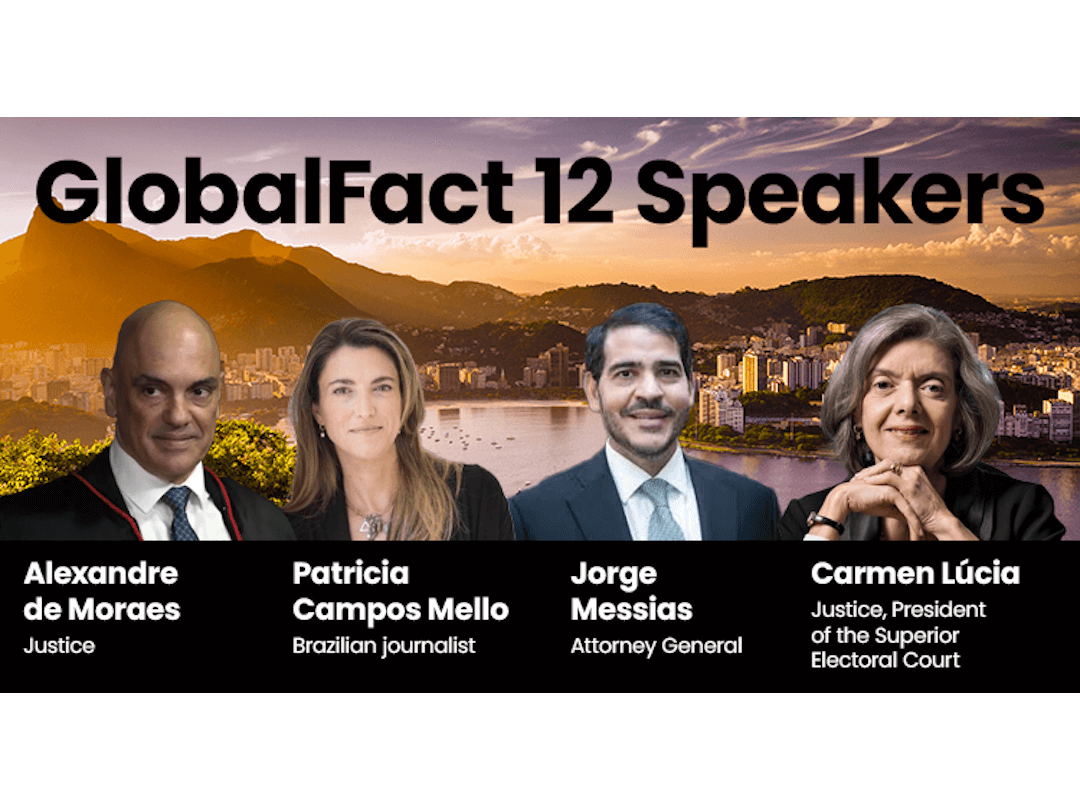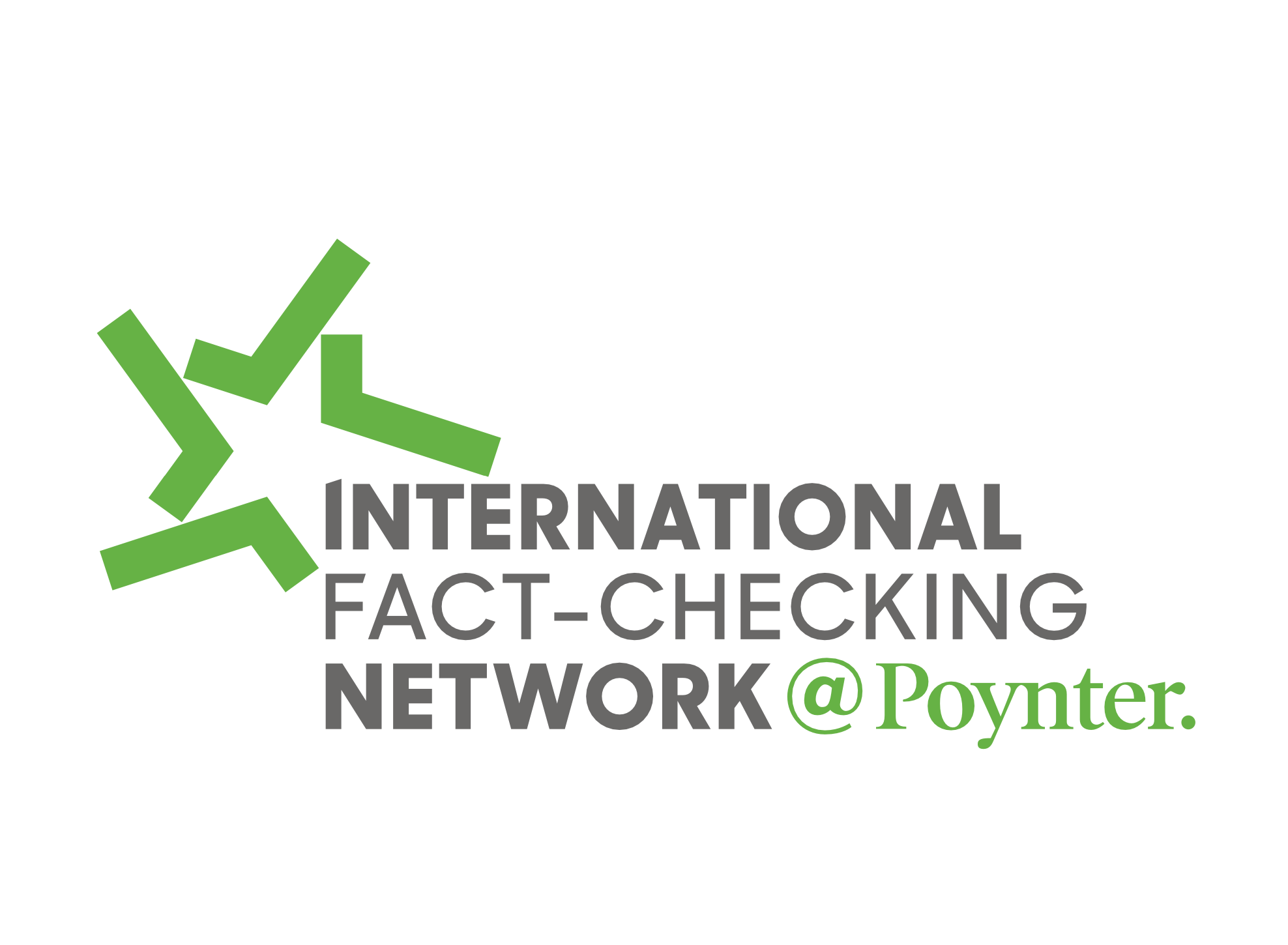RIO DE JANEIRO — As 10:30 p.m. approached on a Friday night in Rio, 17 fact-checkers streamed into a pink house in the southern neighborhood of Botafogo.
On the second floor, they hovered around the evening TV newscast, waiting for the final poll on the upcoming mayoral election to be released. But the newscast ended without it. They shook their heads as the announcer transitioned instead to “The Law of Love,” a soap opera, and took their positions for the night’s main event: the last debate among the city’s candidates for mayor.
This was to be Brazil’s first live collaboration across the country’s major fact-checking groups.

Aos Fatos’s Ana Freitas and Tai Nalon and Pública’s Maurício Moraes check claims made by Rio de Janeiro mayoral candidates at the Pública house in Rio.
The three recently-founded Brazilian fact-checking initiatives — Aos Fatos, Lupa, and Truco — have grown more influential this election cycle. They have established partnerships with prominent media outlets, become a trusted source for mainstream reports and fodder for questions asked during televised debates.
“We launched […] in order to re-establish dialogue between those who make policies and those who effectively suffer their consequences,” wrote Tai Nalon of Aos Fatos in a July editorial.
Brazil’s fact-checking has blossomed in a year of controversy. An anti-corruption probe resulted in jailing of figures at the highest levels of business and politics; Brazil became the latest Latin American country in a string of impeachments; and the new government’s attempt to fast-track austerity measures through Congress has caused nationwide protest.
A comment by Argentine fact-checker Laura Zommer about polarization in her own country, made at a Rio journalism event this year, resonated with Brazilians as well: “It’s common to see two people look back at the exact same set of events and give extremely different explanations for why things happened.”
Amid this chaos, it’s possible fact-checking might be able to influence traditional political coverage in Brazil, said Claudia Antunes, who served as a reporter and editor for a combined 25 years at newspapers Folha de São Paulo and at Jornal do Brasil.
“They are an important addition to a media landscape in which only one of the major newspapers has a corrections column,” she said.
Lupa founder Cristina Tardáguila proposed a collaboration among fact-checkers after traveling to the United States to participate in a similar effort spearheaded by Univision for the third presidential debate.
Per Tardáguila’s suggestion, the Rio fact-checkers produced a common transcript of the mayoral debate (inspired by NPR’s transcript-checking of U.S. debates) to better divide work.
Once complete, each organization distributed the fact checks via its own site and social media accounts. Tardáguila also invited civil society watchdog group Meu Rio, which had assembled a panel of specialists for a “lie detector” commentary of the previous debate.

Screenshot, aosfatos.org
Rio’s election laid bare the divisions of modern Brazilian politics. In the first round, the centrist, pro-corporate political heir of the mayor who oversaw the Olympics was eliminated, in part due to revelations that he beat his ex-wife.
Brazil’s leftist Worker’s Party, reeling from President Dilma Rousseff’s impeachment, had no competitive candidate. That left the runoff between human rights worker and leftist state Rep. Marcelo Freixo and conservative pentecostal bishop and Senator Marcello Crivella, each recruiting support from progressive and conservative politicians who lost in the first round.

FILE – In this Sept. 29, 2014 file photo, Marcelo Crivella, bishop of the Universal Church of the Kingdom of God, campaigns in Copacabana, Rio de Janeiro, Brazil. (AP Photo/Leo Correa, File)
The work of fact-checking can get drowned out in Brazil, where journalism is usually not the most important factor in deciding municipal elections. It often has more to do with the number of minutes of TV advertising each party is allowed, said University of São Paulo journalism professor and ex-public broadcasting executive Eugênio Bucci.
The larger the party’s alliance inside city hall, the more minutes it is awarded.
“São Paulo this year is very typical, with the two top candidates in the election from the two largest party coalitions,” he said.
But Rio bucked this rule, with Freixo defeating a candidate with 19 times more television time. Media investigations played a role in civil society campaigns that eliminated his opponent, Antunes said.
Lupa fact checks during this election have influenced reports in the newspaper Folha de São Paulo, where a widely read columnist highlighted lies about graduate degrees in two candidate biographies, and Rio newspaper O Globo, which did a deep dive into one candidate’s use of public office to defend the church after a fact check unearthed a few examples.
Lupa and Aos Fatos ran stories directly in Folha and web portal UOL, and Pública trained fact checkers from local outlets in the cities of Belem and Recife to check debates. An Aos Fatos fact check about bus fares inspired a question asked by a journalist in a live television debate in São Paulo.
Brazilian politicians who altered their talking points after earning a “false” from fact-checkers over the course of the campaign include São Paulo candidate Fernando Haddad and Crivella.
“We also noted that campaigns started to reply to our requests with more attention, sending links or documents about the data in question,” said Lupa’s Dal Piva.
As Rio’s final debate began, the second floor of the Pública house clicked with the sounds of transcription. On the third floor, editors from Aos Fatos, Lupa, and Pública, and Meu Rio director Rodrigo Arnaiz watched their computer screens as the dialogue of the debate took shape in a Google document. They highlighted different sentences and murmured to each other: “We’ve done that one,” or, “Does anyone have this?”
Arnaiz delegated fact checks to his organization’s office several blocks away, where a team of economists, urban planners and researchers was assembled; fact-checkers for the other three organizations filled the first floor of the Pública house. Did Crivella really say in a past speech that women should obey men? A Meu Rio researcher quickly commented in the Google doc with a link to the speech. Out it went. Did Freixo have concrete plans to reform multi-use clinics as he said? That got a “whopper” from Pública. It was nowhere in the two different versions of his platform.

Screenshot apublica.org
About 30 claims were fact-checked over the course of the evening. Many had already surfaced in previous weeks (“They really repeat themselves a lot,” Pública’s Anna Queiroz mused). But some were new, and some prompted discussion.
If a candidate makes a biblical joke to accuse another of distributing political favors through the church, how explicit must the accusation be in order to be checked? If one candidate was reported in a newspaper column as being accused in an anti-corruption probe, but no government report of the accusation has been issued, can his opponent say he has been “named in the probe?”
On this, researchers from Lupa and Meu Rio gave different evaluations. The teams were not required to make the same judgments about the facts in question, but they were required to cite sources.
“The reader can look at the source and draw their own conclusions,” said Juliana Dal Piva. “Similarly, we don’t publish lists during the campaign of ‘who lied the most,’ partially because we can’t check everything. If you are curious about the issues and take a look at the fact checks, you can get a pretty clear idea of what strategies the candidates are proposing to deal with problems in the city and how consistent they are.”
Meu Rio reported its fact checks were viewed by 70,000 people, 20,000 more than during the first round of the election, when the group had worked only with Lupa. In the days between the debate and the Oct. 30 election, Lupa gained 2,000 Twitter followers; Aos Fatos added 30,000 over the election period.
In a post-debate evaluation, the fact-checkers concluded that their division of labor went smoothly, although transcription could have used more manpower.
Fact-checking continued after the debate ended; several blocks away at Meu Rio, economist Vitor Mihessen was still calculating the area covered by parks in different regions of the city when Arnaiz arrived on foot. Finally he published his check: a “true” that 70 percent of public culture facilities are in the richest neighborhoods with only 20 percent of the population
“I definitely feel like we’ve provided lots of context for people who are interested,” Mihessen said. “But I’m nervous about how voters actually get information.”
Attack videos and links about both candidates shot back and forth – some true, many false. The fake attacks on each candidate were so intense in the campaign that each published their own website denouncing them. Mihessen pulled up a video of Crivella at a fundraiser that was later debunked as having been edited to sound more offensive.
“Our online information networks often simply reproduce views we would hear in the real world, in our neighborhoods and churches,” Antunes said.
The election was held two days after the debate. On Saturday, Dal Piva went on a prominent radio network to speak about the results of the group fact check. Visits to the Aos Fatos site from organic web searches increased by 200 percent in the days between the debate and the election. When votes were counted, Crivella won with 59 percent of votes.
Eugênio Bucci said his greatest concern about media coverage of the election is the consolidation of an unregulated trio of churches, political parties and government-controlled broadcast frequencies. Rede Record, which is owned by a bishop, played a major role in Crivella’s victory, Bucci said.
Record is also Brazil’s second-largest television network. The fact-checkers could not check the debate on TV Record because it was cancelled.
If Brazil is unable to regulate its media the way the U.S. does with the FCC, fact-checking at least might help bring nonpartisan analysis to TV political coverage.
“Due to agreements between networks and candidates, the moderators in most Brazilian debates, unlike in some other countries, very rarely interject when a candidate is lying,” he said.
Hundreds of fact checks completed this election have essentially recorded candidate promises into a public archive that can be used to evaluate the new administration, Dal Piva said.
Brazilian fact-checking initially gained a wide audience during the 2014 presidential election, when Rousseff was elected on promises that she would not impose austerity measures. But when she was in office, she pushed for it.
“Having those promises so clearly defined by fact-checkers increased scrutiny on Rousseff once elected,” Dal Piva said.
That will be the case with Rio, too, she said.
“Voters will be able to judge the new administration based on the promises made and the outcomes they see,” Dal Piva said.






